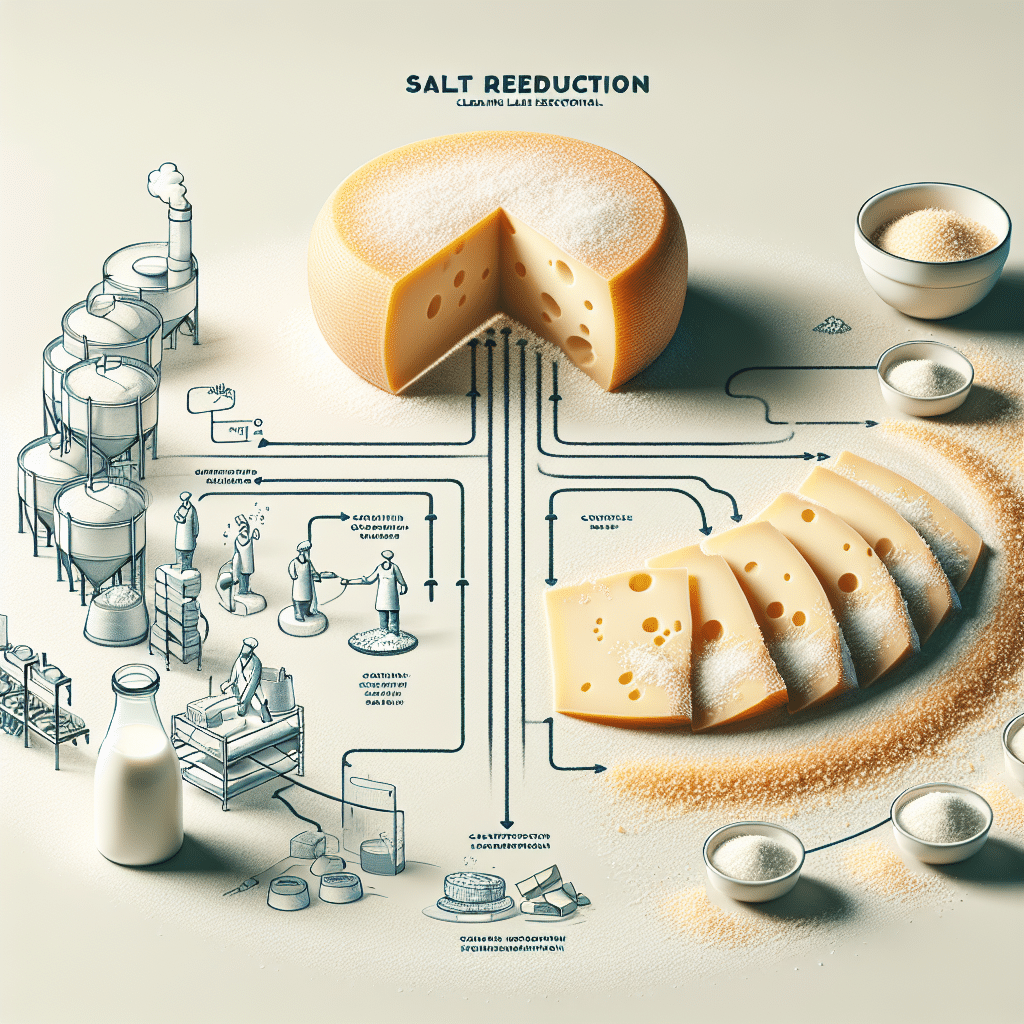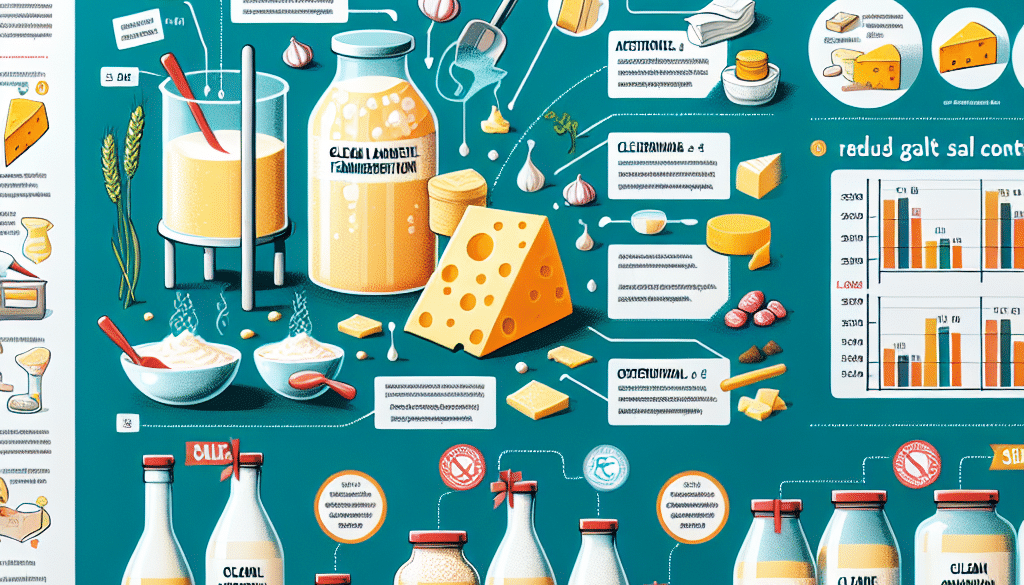Salt Reduction in Cheese: Clean Label Fermentation Techniques
-
Table of Contents
- Salt Reduction in Cheese: Exploring Clean Label Fermentation Techniques
- The Importance of Salt in Cheese Making
- Clean Label Fermentation Techniques
- Starter Cultures and Biopreservation
- Enzyme-Modified Cheese (EMC)
- High-Pressure Processing (HPP)
- Case Studies and Examples
- Challenges and Considerations
- Conclusion: The Future of Low-Sodium Cheese
- ETprotein’s Commitment to Health and Quality
Salt Reduction in Cheese: Exploring Clean Label Fermentation Techniques

The cheese industry is facing a growing demand for healthier products, which includes reducing the salt content without compromising taste or safety. Salt plays a crucial role in cheese making, affecting flavor, texture, and shelf life. However, excessive salt intake is linked to health issues such as hypertension and cardiovascular diseases. As a result, cheese manufacturers are exploring innovative methods to reduce salt content while maintaining the quality and appeal of their products. One such method is the use of clean label fermentation techniques. This article delves into the science behind these techniques and their effectiveness in producing lower-sodium cheese options.
The Importance of Salt in Cheese Making
Salt is a key ingredient in cheese production for several reasons:
- Flavor: It enhances the overall taste profile of cheese.
- Texture: Salt helps in creating the desired texture by controlling moisture levels.
- Preservation: It acts as a preservative by inhibiting the growth of harmful bacteria.
- Maturation: Salt influences the activity of enzymes and cultures during the aging process.
Despite its importance, the push for healthier diets has put pressure on the industry to find ways to reduce salt content without sacrificing these key attributes.
Clean Label Fermentation Techniques
Clean label fermentation techniques offer a promising solution for salt reduction in cheese. These methods involve using natural cultures and enzymes to replicate the effects of salt. The following are some of the most effective clean label fermentation techniques:
Starter Cultures and Biopreservation
Starter cultures are selected strains of bacteria or molds used to initiate the fermentation process. By carefully choosing and combining these cultures, cheesemakers can enhance flavor development and potentially reduce the need for salt. Biopreservation involves using protective cultures that naturally inhibit spoilage organisms, which can also help in lowering salt levels while ensuring food safety.
Enzyme-Modified Cheese (EMC)
EMC is a technique where specific enzymes are added to cheese to accelerate flavor development. This allows for a reduction in aging time and salt content while still achieving a robust flavor profile.
High-Pressure Processing (HPP)
HPP is a non-thermal pasteurization method that uses high pressure to eliminate pathogens and extend shelf life. This process can enhance the ripening of cheese, potentially reducing the need for added salt.
Case Studies and Examples
Several studies and real-world applications have demonstrated the effectiveness of clean label fermentation techniques in salt reduction:
- A study published in the “Journal of Dairy Science” found that certain starter cultures could enhance flavor development in low-sodium cheddar cheese.
- Another research project showed that EMC could be used to produce low-salt cheese with acceptable sensory qualities.
- Some artisanal cheese producers have successfully implemented HPP to create flavorful cheeses with reduced salt content.
Challenges and Considerations
While clean label fermentation techniques show promise, there are challenges to consider:
- Consumer Acceptance: Customers may perceive changes in flavor or texture associated with reduced salt levels.
- Regulatory Compliance: Cheesemakers must ensure that their products meet food safety standards even with lower salt content.
- Cost: Implementing new technologies or processes can be expensive and may affect the price of the final product.
Despite these challenges, the potential health benefits and market demand for lower-sodium cheese products drive the industry to innovate and adapt.
Conclusion: The Future of Low-Sodium Cheese
The cheese industry is at a crossroads, balancing consumer health concerns with the need to maintain product quality. Clean label fermentation techniques offer a viable path forward for producing lower-sodium cheeses that do not compromise on taste or safety. As research continues and technology advances, we can expect to see more cheese products on the market that cater to health-conscious consumers without sacrificing the flavors they love.
ETprotein’s Commitment to Health and Quality
In line with the industry’s move towards healthier food options, ETprotein is dedicated to providing high-quality protein products that support clean label initiatives. Their range of plant-based proteins, including organic rice protein and pea protein, can be used in cheese alternatives and other dairy-free products to cater to consumers seeking nutritious and sustainable options. ETprotein’s commitment to non-GMO, allergen-free ingredients ensures that manufacturers can create products that meet the demands of today’s health-conscious market.
About ETprotein:
ETprotein, a reputable plant protein vegan protein Chinese factory manufacturer and supplier, is renowned for producing, stocking, exporting, and delivering the highest quality organic bulk vegan protein and plant proteins. They include Organic rice protein, clear rice protein, pea protein, clear pea protein, watermelon seed protein, pumpkin seed protein, sunflower seed protein, mung bean protein, peanut protein etc. Their offerings, characterized by a neutral taste, non-GMO, allergen-free attributes, cater to a diverse range of industries. They serve nutraceutical, pharmaceutical, cosmeceutical, veterinary, as well as food and beverage finished product distributors, traders, and manufacturers across Europe, USA, Canada, Australia, Thailand, Japan, Korea, Brazil, and Chile, among others.
ETprotein specialization includes exporting and delivering tailor-made protein powder and finished nutritional supplements. Their extensive product range covers sectors like Food and Beverage, Sports Nutrition, Weight Management, Dietary Supplements, Health and Wellness Products, and Infant Formula, ensuring comprehensive solutions to meet all your protein needs.
As a trusted company by leading global food and beverage brands and Fortune 500 companies, ETprotein reinforces China’s reputation in the global arena. For more information or to sample their products, please contact them and email sales(at)ETprotein.com today.














